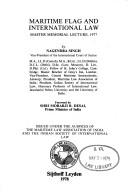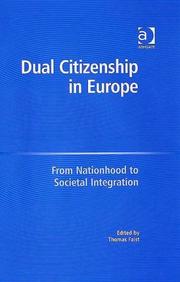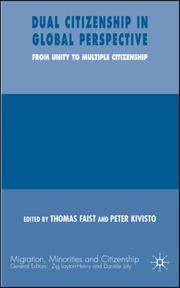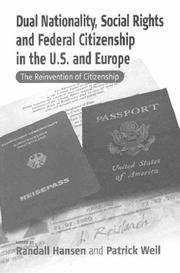| Listing 1 - 10 of 429 | << page >> |
Sort by
|

ISBN: 9028607684 9789028607682 Year: 1978 Publisher: Leyden Sijthoff
Abstract | Keywords | Export | Availability | Bookmark
 Loading...
Loading...Choose an application
- Reference Manager
- EndNote
- RefWorks (Direct export to RefWorks)
Shipping law --- Ships --- Navires --- Nationality --- Nationalité --- Nationality. --- Nationalité --- Ships - Nationality

ISBN: 9041119329 9786610468188 1417551399 1280468181 9047403185 9781417551392 Year: 2003 Publisher: The Hague New York Kluwer Law International
Abstract | Keywords | Export | Availability | Bookmark
 Loading...
Loading...Choose an application
- Reference Manager
- EndNote
- RefWorks (Direct export to RefWorks)
The increased emergence of dual and multiple nationality in our globalized world has recently led to public and scholarly debates on a number of resulting practical questions. This book comprehensively evaluates the legal status of dual nationals on the basis of a comparative analysis, with emphasis on practice and law in the United States of America, the Federal Republic of Germany, Turkey and other selected countries, comprising contributions of both academics and practitioners. Among the legal subjects examined more intensively are the exercise of political rights by dual nationals, including voting and office holding, performance of military service, loss and withdrawal of citizenship, and effects of dual nationality on judicial cooperation, as well as aspects of private international law. The authors pay attention to developmental trends and legal changes in various countries, and also to the philosophical and theoretical perspectives underlying various practices. Specific recommendations for states dealing with dual nationality complete the investigation.
Dual nationality --- Conflict of laws --- Citizenship --- Dual nationality. --- International comparison. --- Double nationality --- Dual allegiance --- Dual citizenship --- Nationality, Dual --- Nationality, Plural --- Plural nationality --- Law and legislation --- World politics.

ISBN: 1317147642 1317147634 1281103780 9786611103781 0754683524 9780754683520 9780754649144 0754649148 9781317147640 9781317147633 9781281103789 6611103783 9781315578231 9781317147626 9781138275584 1315578239 Year: 2007 Publisher: Aldershot, England ; Burlington, VT : Ashgate,
Abstract | Keywords | Export | Availability | Bookmark
 Loading...
Loading...Choose an application
- Reference Manager
- EndNote
- RefWorks (Direct export to RefWorks)
In an age of terrorism and securitized immigration, dual citizenship is of central concern. The contributors to this timely volume examine policies regarding dual citizenship across Europe, covering a wide spectrum of countries. The case studies explore the negotiated character and boundaries of political membership and the fundamental beliefs and arguments which have shaped debates and policies on citizenship.
Citizenship --- Dual nationality --- Double nationality --- Dual allegiance --- Dual citizenship --- Nationality, Dual --- Nationality, Plural --- Plural nationality --- Conflict of laws --- Law and legislation
Book
ISBN: 9780814724347 0814724345 9780814785829 0814785824 0814724418 Year: 2016 Publisher: New York, NY
Abstract | Keywords | Export | Availability | Bookmark
 Loading...
Loading...Choose an application
- Reference Manager
- EndNote
- RefWorks (Direct export to RefWorks)
Read Peter's Op-ed on Trump's Immigration Ban in The New York TimesThe rise of dual citizenship could hardly have been imaginable to a time traveler from a hundred or even fifty years ago. Dual nationality was once considered an offense to nature, an abomination on the order of bigamy. It was the stuff of titanic battles between the United States and European sovereigns. As those conflicts dissipated, dual citizenship continued to be an oddity, a condition that, if not quite freakish, was nonetheless vaguely disreputable, a status one could hold but not advertise. Even today, some Americans mistakenly understand dual citizenship to somehow be “illegal”, when in fact it is completely tolerated. Only recently has the status largely shed the opprobrium to which it was once attached.At Home in Two Countries charts the history of dual citizenship from strong disfavor to general acceptance. The status has touched many; there are few Americans who do not have someone in their past or present who has held the status, if only unknowingly. The history reflects on the course of the state as an institution at the level of the individual. The state was once a jealous institution, justifiably demanding an exclusive relationship with its members. Today, the state lacks both the capacity and the incentive to suppress the status as citizenship becomes more like other forms of membership. Dual citizenship allows many to formalize sentimental attachments. For others, it’s a new way to game the international system. This book explains why dual citizenship was once so reviled, why it is a fact of life after globalization, and why it should be embraced today.
Dual nationality --- Double nationality --- Dual allegiance --- Dual citizenship --- Nationality, Dual --- Nationality, Plural --- Plural nationality --- Citizenship --- Conflict of laws --- History. --- Law and legislation

ISBN: 023000654X 9780230006546 Year: 2007 Publisher: Basingstoke : Palgrave Macmillan,
Abstract | Keywords | Export | Availability | Bookmark
 Loading...
Loading...Choose an application
- Reference Manager
- EndNote
- RefWorks (Direct export to RefWorks)
#SBIB:321H30 --- Hedendaagse politieke en sociale theorieën (vanaf de 19de eeuw): algemeen (incl. utilitarisme, burgerschap) --- Citizenship --- Dual nationality --- Globalization --- Double nationality --- Dual allegiance --- Dual citizenship --- Nationality, Dual --- Nationality, Plural --- Plural nationality --- Conflict of laws --- Law and legislation

ISBN: 1571818049 1571818057 9781571818058 9781571818041 1789204119 9781789204117 Year: 2002 Publisher: New York: Berghahn,
Abstract | Keywords | Export | Availability | Bookmark
 Loading...
Loading...Choose an application
- Reference Manager
- EndNote
- RefWorks (Direct export to RefWorks)
Dual nationality --- Conflict of laws --- Double nationalité --- Nationalité (Droit international privé) --- Citizenship --- Citizenship. --- Double nationalité --- Nationalité (Droit international privé) --- Dual nationality - United States --- Dual nationality - Europe --- Conflict of laws - Citizenship --- Double nationality --- Dual allegiance --- Dual citizenship --- Nationality, Dual --- Nationality, Plural --- Plural nationality --- Law and legislation
Book
ISBN: 1108566375 1108554172 1108676456 1108429157 9781108676458 9781108554176 9781108429153 9781108453189 110845318X 9781108453189 Year: 2018 Publisher: Cambridge [UK] New York, NY
Abstract | Keywords | Export | Availability | Bookmark
 Loading...
Loading...Choose an application
- Reference Manager
- EndNote
- RefWorks (Direct export to RefWorks)
Citizenship is no longer an exclusive relationship. Many people today are citizens of multiple countries, whether by birth, naturalization, or even through monetary means, with schemes fast-tracking citizenship applications from foreigners making large investments in the state. Moral problems surround each of those ways of acquiring a second citizenship, while retaining one's original citizenship. Multiple citizenship can also have morally problematic consequences for the coherence of collective decisions, for the constitution of the demos, and for global inequality. The phenomenon of multiple citizenship and its ramifications remains understudied, despite its magnitude and political importance. In this innovative book, Ana Tanasoca explores these issues and shows how they could be avoided by unbundling the rights that currently come with citizenship and allocating them separately. It will appeal to scholars and students of normative political theory, citizenship, global justice, and migration in political science, law, and sociology.
Dual nationality. --- Citizenship. --- Conflict of laws --- Citizenship --- Dual nationality --- Birthright citizenship --- Citizenship (International law) --- National citizenship --- Nationality (Citizenship) --- Political science --- Public law --- Allegiance --- Civics --- Domicile --- Political rights --- Double nationality --- Dual allegiance --- Dual citizenship --- Nationality, Dual --- Nationality, Plural --- Plural nationality --- Law and legislation
Book
ISBN: 1280569581 9786613599186 9004227210 9789004227217 9004227202 9789004227200 Year: 2012 Publisher: Leiden BRILL
Abstract | Keywords | Export | Availability | Bookmark
 Loading...
Loading...Choose an application
- Reference Manager
- EndNote
- RefWorks (Direct export to RefWorks)
The book examines the phenomenon of dual nationality in the European Union, particularly against the background of the status of European citizenship – a status that is linked to the nationality of each EU Member State. While the first part sets out the approach towards (dual) nationality in Public and Private International Law as well as in EU Law, the second part consists of an overview of the dual nationality regimes in France, Italy, the Netherlands and Spain. The book shows that the autonomy of Member States in the field of nationality law is becoming increasingly problematic for the EU, and the author takes the position that there is arguably a need for the (minimum) harmonization of European nationality laws.
Public welfare --- LAW / Constitutional --- LAW / Public --- Benevolent institutions --- Poor relief --- Public assistance --- Public charities --- Public relief --- Public welfare reform --- Relief (Aid) --- Social welfare --- Welfare (Public assistance) --- Welfare reform --- Human services --- Social service --- Law and legislation --- Government policy --- Dual nationality --- Double nationality --- Dual allegiance --- Dual citizenship --- Nationality, Dual --- Nationality, Plural --- Plural nationality --- Citizenship --- Conflict of laws --- Double nationalité --- Citoyenneté --- Dual nationality - France --- Dual nationality - Netherlands --- Dual nationality - Germany --- Dual nationality - Spain --- France --- Espagne --- Pays-Bas --- Italie

ISBN: 9053569227 9786611191153 1281191159 904850158X 9789048501588 9789053569221 9781281191151 6611191151 Year: 2007 Publisher: Amsterdam : Amsterdam University Press,
Abstract | Keywords | Export | Availability | Bookmark
 Loading...
Loading...Choose an application
- Reference Manager
- EndNote
- RefWorks (Direct export to RefWorks)
Latest IMISCOE publication analyses citizenship policies in the ten new EU Member States
Citizenship -- Europe. --- Citizenship -- European Union countries. --- Citizenship. --- Citizenship --- Nationality. --- Migration policy. --- Nationalité --- Nationalité --- Citoyenneté --- European Union.
Book
ISBN: 9004303502 9004303499 9789004303492 9789004303508 Year: 2015 Publisher: Leiden ; Boston : Brill Nijhoff,
Abstract | Keywords | Export | Availability | Bookmark
 Loading...
Loading...Choose an application
- Reference Manager
- EndNote
- RefWorks (Direct export to RefWorks)
Jurisdiction over Ships: Post-UNCLOS Developments in the Law of the Sea analyses international law developments in shipping since the adoption of the UN Convention on the Law of the Sea (UNCLOS) in 1982. The Convention’s rules on the rights and obligations of flag states, coastal states and port states, have by and large been accepted and adhered to by states, but the legal regime for the oceans is neither complete nor static, nor was it intended to be so. New issues have surfaced while old issues have changed their character. Developments in law and practice have already resulted in some divergences between the jurisdictional scheme outlined in UNCLOS and how states in reality exercise their jurisdiction over ships. In this book, 18 leading academics in the field study a number of such developments in more detail, providing a practical guide to the state of the law at present while at the same time offering insights into how international law develops in this field.
Jurisdiction over ships at sea. --- Ships --- Law of the sea. --- Merchant ships --- Nationality of ships --- Registry of ships --- Ships, Nationality of --- International law --- Maritime law --- High seas, Jurisdiction over --- Marine law --- Ocean law --- Ocean --- Sea, Law of the --- Territorial waters --- Freedom of the seas --- War, Maritime (International law) --- Nationality. --- Registry --- Registration and transfer --- Law and legislation --- Nationality --- Jurisdiction over ships at sea --- Ships - Nationality --- Law of the sea --- Etats-Unis
| Listing 1 - 10 of 429 | << page >> |
Sort by
|

 Search
Search Feedback
Feedback About UniCat
About UniCat  Help
Help News
News